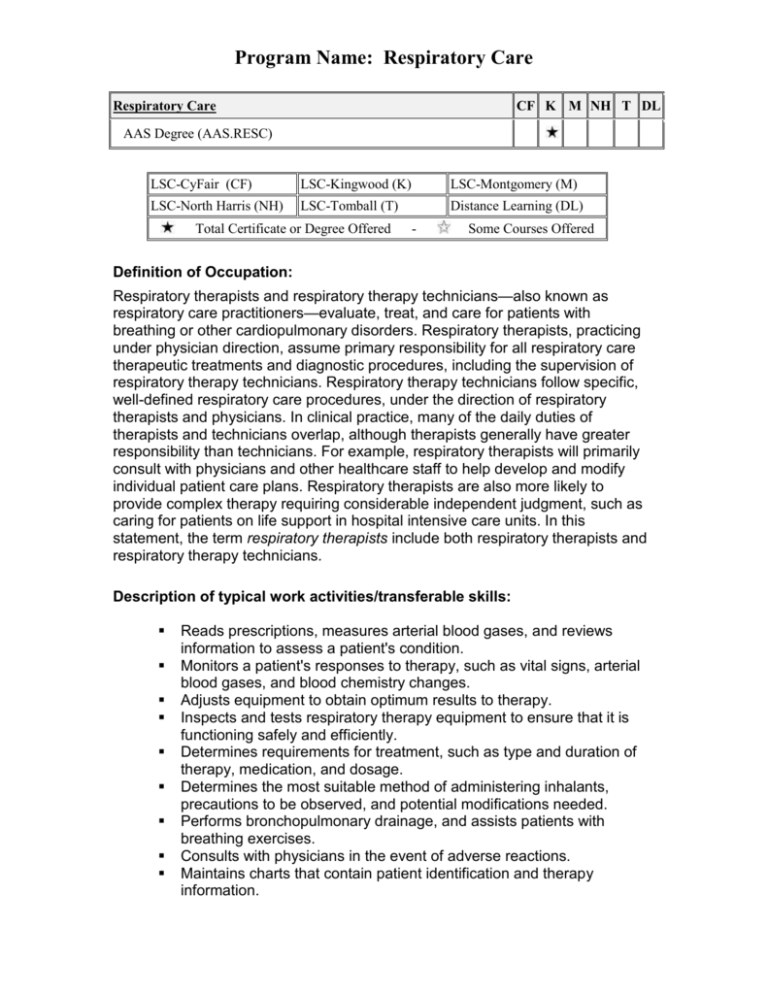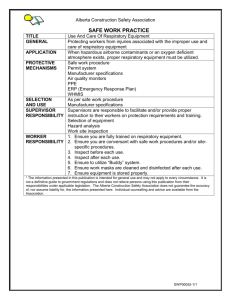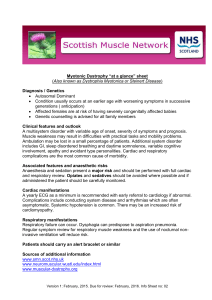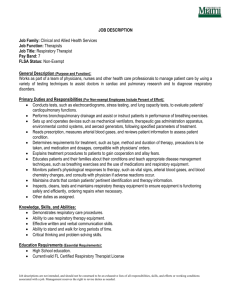Respiratory Care - Lone Star College System
advertisement

Program Name: Respiratory Care Respiratory Care CF K M NH T DL AAS Degree (AAS.RESC) LSC-CyFair (CF) LSC-Kingwood (K) LSC-Montgomery (M) LSC-North Harris (NH) LSC-Tomball (T) Distance Learning (DL) Total Certificate or Degree Offered - Some Courses Offered Definition of Occupation: Respiratory therapists and respiratory therapy technicians—also known as respiratory care practitioners—evaluate, treat, and care for patients with breathing or other cardiopulmonary disorders. Respiratory therapists, practicing under physician direction, assume primary responsibility for all respiratory care therapeutic treatments and diagnostic procedures, including the supervision of respiratory therapy technicians. Respiratory therapy technicians follow specific, well-defined respiratory care procedures, under the direction of respiratory therapists and physicians. In clinical practice, many of the daily duties of therapists and technicians overlap, although therapists generally have greater responsibility than technicians. For example, respiratory therapists will primarily consult with physicians and other healthcare staff to help develop and modify individual patient care plans. Respiratory therapists are also more likely to provide complex therapy requiring considerable independent judgment, such as caring for patients on life support in hospital intensive care units. In this statement, the term respiratory therapists include both respiratory therapists and respiratory therapy technicians. Description of typical work activities/transferable skills: Reads prescriptions, measures arterial blood gases, and reviews information to assess a patient's condition. Monitors a patient's responses to therapy, such as vital signs, arterial blood gases, and blood chemistry changes. Adjusts equipment to obtain optimum results to therapy. Inspects and tests respiratory therapy equipment to ensure that it is functioning safely and efficiently. Determines requirements for treatment, such as type and duration of therapy, medication, and dosage. Determines the most suitable method of administering inhalants, precautions to be observed, and potential modifications needed. Performs bronchopulmonary drainage, and assists patients with breathing exercises. Consults with physicians in the event of adverse reactions. Maintains charts that contain patient identification and therapy information. Levels of Education: Certificate: None Associate: Associate of Applied Science Degree in Respiratory Care PLEASE NOTE: Not designed to transfer to most Bachelor degree programs. Speak to a counselor or advisor for options. Special Admissions/Prerequisite Courses: The respiratory care program begins in the spring semester. Completion is in the fall semester of the second year. In addition to the district admission requirements, the following are requirements for the respiratory therapist program: Pre-Application: 1. Graduation from high school verified with high school transcript; OR GED certificate verified by a copy of the certificate; 2. Official transcripts from all colleges or universities previously attended; 3. ASSET test scores of 41 on reading and 45 on writing, and a score of 15 on the local math test OR the eligibility to enter ENGL 1301 and MATH 0310 by completion of ENGL 0305 and 0307 with a grade of "A" or "B". Completion of MATH 0308 with a grade of "A" or "B", OR pass the reading section on the THEA. Score a 15 on the local math test OR score a 19 on the reading section and a score of 19 on the math section of the ACT test. Student Selection: 6. Students are ranked and selected on the following criteria by the admissions committee. a. Completion of all general academic courses for the respiratory care program. b. Completion of BIOL 2401 and any college level Math course. c. GPA d. Date of application. 7. A physical examination report, with laboratory tests and immunization records signed by a licensed physician within three weeks of the first class day. (Form provided.) 8. A CPR course for health-care professionals (offered through the Continuing Education department with a non-credit course or the physical education department with a credit course.) 9. Hepatitis B vaccination is required for all admissions to the respiratory care program. The enrolling student must have begun the series of three vaccines prior to entering the clinical practicum in the hospital setting. Method of Delivery: Traditional/On-Campus Distance Learning Distance Learning and Traditional Fast - Track Some typical job titles for Respiratory Care: Certificates: None Associate Degree: Respiratory Therapist Respiratory Therapist Technicians Respiratory Care Practitioners Types of Companies that typically hire graduates: Hospitals Anesthesiology Pulmonary Medicine Respiratory therapy clinics Offices of physicians Nursing Homes Firms that supply respiratory equipment Workplace Skills: Therapists should be sensitive to patients’ physical and psychological needs. Respiratory care practitioners must pay attention to detail, follow instructions, and work as part of a team. In addition, operating advanced equipment requires proficiency with computers. The following information is provided for individuals seeking career counseling. The MBTI provides information regarding an individual’s personality preferences and the Holland code provides information regarding an individual’s interest. If you are interested in learning more about how your interests and personality fit in with this and other career options, please see a career counselor at any of the NHMCCD campuses Myers-Briggs Type (MBTI): INFJ ENFP ENTP ENFJ Holland Interest Code: Investigative Realistic Social Working Condition Requirements: Respiratory therapists generally work between 35 and 40 hours a week. Because hospitals operate around the clock, therapists may work evenings, nights, or weekends. They spend long periods standing and walking between patients’ rooms. In an emergency, therapists work under a great deal of stress. Respiratory therapists employed in home healthcare must travel frequently to the homes of patients. Respiratory therapists are trained to work with gases stored under pressure that can be hazardous. Adherence to safety precautions and regular maintenance and testing of equipment minimize the risk of injury. As in many other health occupations, respiratory therapists run a risk of catching an infectious disease but carefully following proper procedures minimize this risk. Industry Certification/Licenses: An associate degree is required to become a respiratory therapist. More than 40 States license respiratory care personnel. Aspiring respiratory care practitioners should check on licensure requirements with the board of respiratory care examiners for the State in which they plan to work. Also, most employers require respiratory therapists to maintain a cardiopulmonary resuscitation (CPR) certification. The National Board for Respiratory Care (NBRC) offers voluntary certification and registration to graduates of programs accredited by CAAHEP or the Committee on Accreditation for Respiratory Care (Co ARC). Two credentials are awarded to respiratory therapists who satisfy the requirements: Registered Respiratory Therapist (RRT) and Certified Respiratory Therapist (CRT). Graduates from accredited programs in respiratory therapy may take the CRT examination. CRTs who meet education and experience requirements can take two separate examinations leading to the award of the RRT credential. The CRT examination is the standard in the States requiring licensure. Earnings: 2007 National average annual earnings for the middle 50% of all workers in this occupation: Average Annual Wage $50,930 Average Annual Range $42,780 to $59,040 Average Hourly Wage $24.49 2007 Texas average annual earnings in this occupation: Average Annual Wage $47,660 Average Hourly Wage $22.91 2007 Houston area average annual earnings in this occupation: Houston-Sugar Land-Baytown MSA $49,530 or $23.81/hr Source: 2008 CHOICES Planner, access.bridges.com PLEASE NOTE: Earnings and salaries will vary with industry, region and experience of employee. Employment Outlook: The employment change from 2006 to 2016 is estimated to be +22.6%. (The National average for all occupations is +13%). In Texas growth is estimated to be 36%. The increasing demand will come from substantial growth in the middle-aged and elderly population - a development that will heighten the incidence of cardiopulmonary disease. Growth in demand also will result from the expanding role of respiratory therapists in case management, disease prevention, emergency care, and the early detection of pulmonary disorders. Older Americans suffer most from respiratory ailments and cardiopulmonary diseases such as pneumonia, chronic bronchitis, emphysema, and heart disease. As their numbers increase, the need for respiratory therapists is expected to increase as well. Job opportunities are expected to be very good. The vast majority of job openings will continue to be in hospitals. However, a growing number of openings are expected to be outside of hospitals, especially in home health care services, offices of physicians or other health practitioners, consumer-goods rental firms, or in the employment services industry as a temporary worker in various settings. Source: 2008 CHOICES Planner, access.bridges.com





